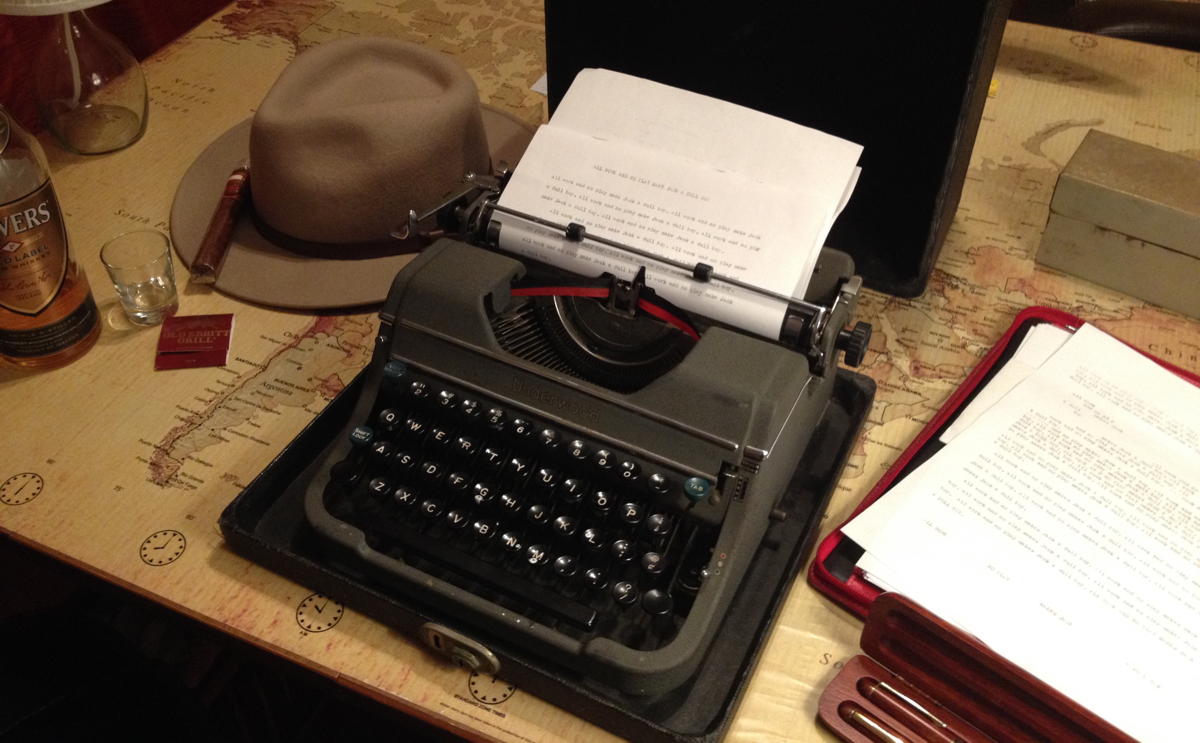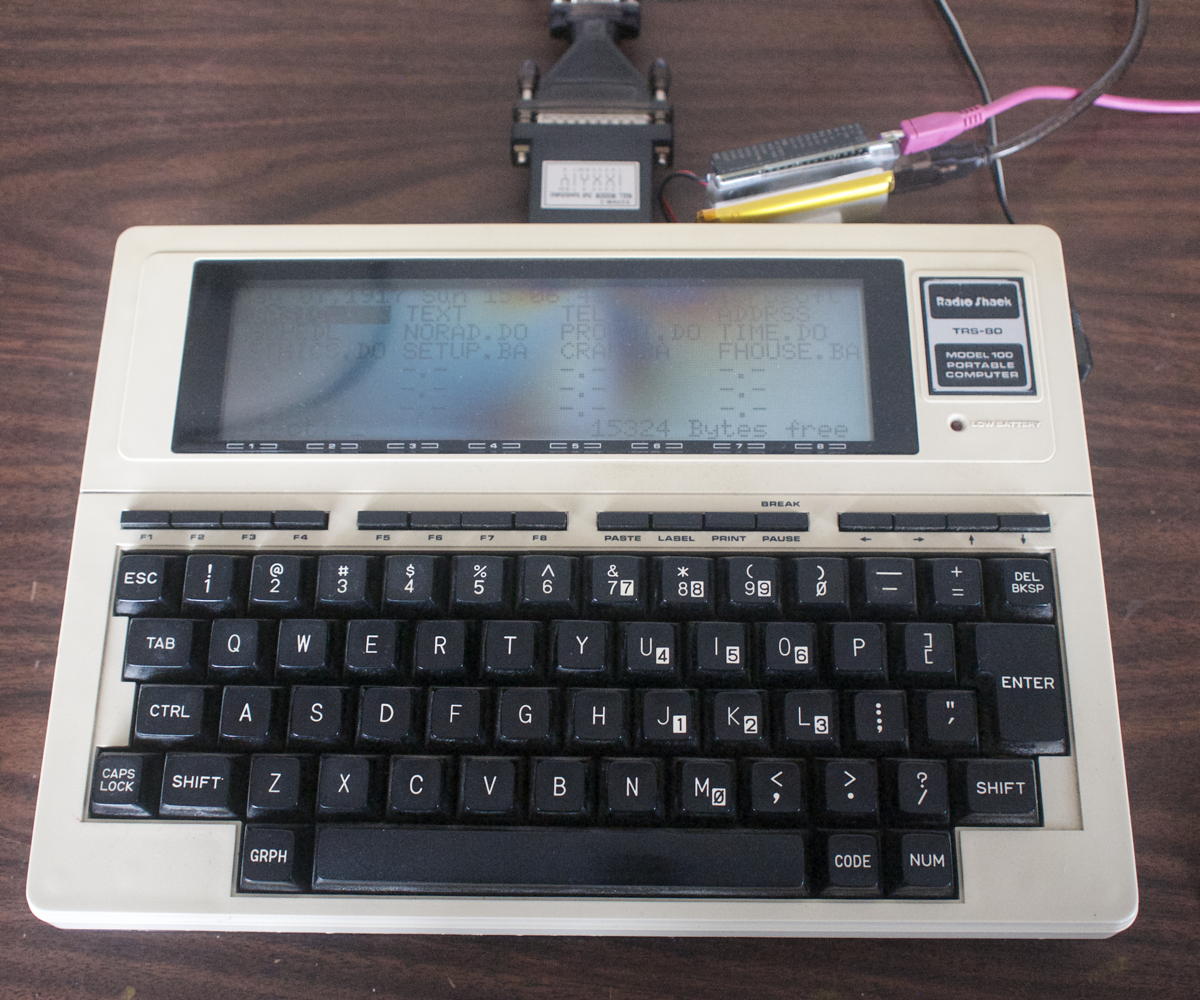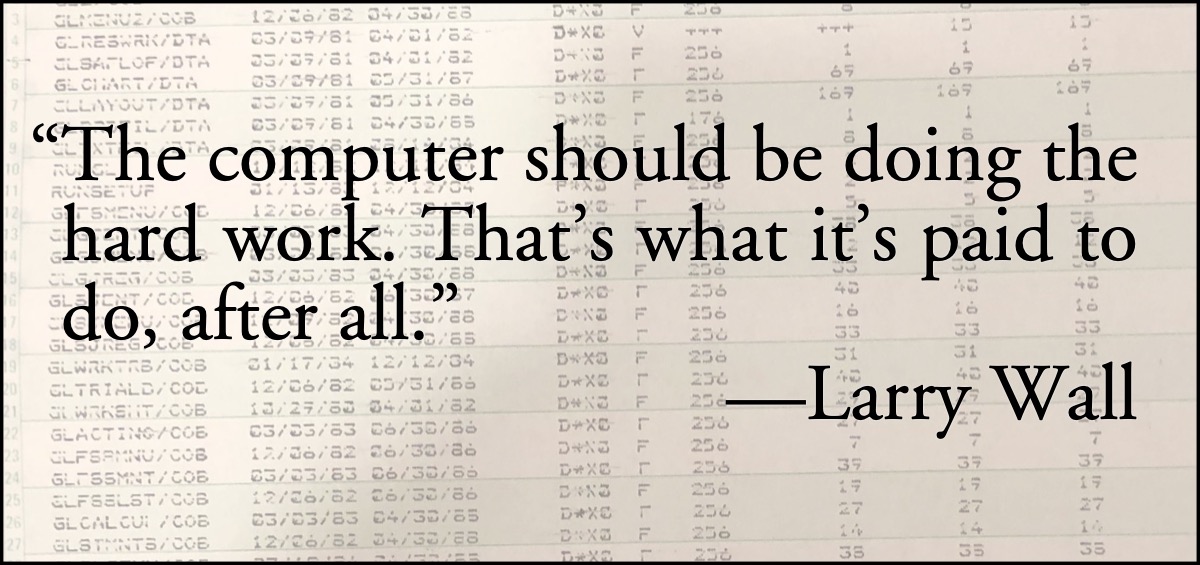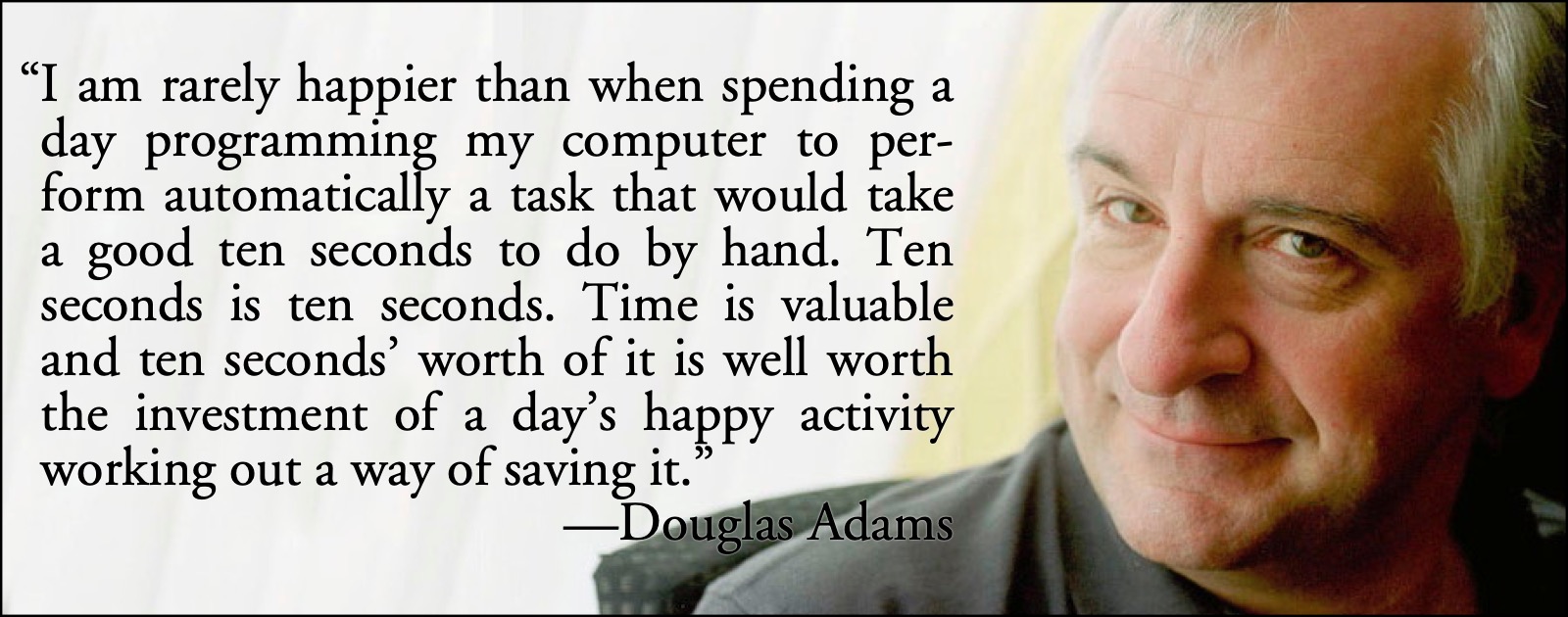Time is not fungible for writers

Some of this photo is a joke about writing stereotypes. The typewriter is serious.
Often, ambitious young men or women write, wanting to work for me or assist me in my research. What they do not understand is that it is a labor of love, and I would relinquish no part of it at any price. I do not need help; I need time.
Louis L’Amour wrote that in his autobiographical Education of a Wondering Man•. It seems contradictory on its face, but I can understand where he’s coming from. Time is very important for writers, and not just the time spent butt-in-chair. I get some of my best ideas during the twilight between sleeping and waking, or when I need to be out the door five minutes ago. I don’t have time to wait for a computer to wake up, or for an app to start up. In those few seconds, the dream-thought is gone, or I am already on the move and my attention has left the great idea and focused on the road.
If you’re following the geeky hinterlands of this blog, you know that I use a TRS-80 Model 100 and a manual typewriter for a lot of my writing. I am not a Luddite: I pretty much always have an iPhone and an iPad available. But when I need to write quickly, I use devices that start quickly.
The boot-up time for a Model 100 is less than a second. The boot-up time for a typewriter is taking off the cover. I keep paper in it at all times. Compare this to the time it takes to unlock a tablet, open the app, and navigate to the appropriate document—possibly also to pair a keyboard with it.
My memory has always been leaky when preparing to write down what’s in my memory. And if the tablet has decided that this time I need to enter my password… I’m screwed. The great idea will be gone by the time I get to where I can write it down.

As might be guessed from the Linux box hanging off the back of this 1983 computer, getting writing out of this writing tool is much more time-consuming that getting writing into it.
I also keep a pad and paper next to my bed, but am wary of writing ideas in the middle of the night. My handwriting is bad enough when I’m awake. In the twilight before waking, it is incomprehensible. I can type faster than I can write by and, and I can type legibly far faster than I can write by hand. Further, the time spent copying from typewritten text to computer or from an ancient computer to a modern computer is worth the time not wasted wrestling with a computer while the idea is fading from short-term memory. I have a lot of mental tricks for remembering good ideas until I have the opportunity to write them. None of them are as reliable as getting the idea down now.
Time is not fungible. Time at different moments, in different situations, has different worth. I am acutely aware of this as a writer, as I type my initial thoughts about this post on a TRS-80 Model 100. It is more time-consuming to save documents on the Model 100 than on the iPad or iMac. While the initial save to the local drive is fast, the transfer to a useful location requires going into Terminal mode and uploading the document to a modern computer.
But I put up with the extra time on the save end because time is not fungible. Time saved on the startup end outweighs time spent on the save end, often infinitely so. Ten seconds lost at the start of writing is ten iterations of an idea gone, probably forever. Once lost, an idea, especially an instantiation of an idea, isn’t guaranteed to return. Time at the end of writing is cheap compared to that potential loss. Everything I can do to decrease the time it takes to get to writing is worth extra time spent after I’m done writing. Maintenance tasks after writing don’t result in forgotten ideas. Tasks before writing, such as starting a computer or app, do.
This is especially true when waking from sleep, as great thoughts disappear very quickly in the transition to wakefulness. But the same is also true when I get ideas while doing other, non-writing things: if I don’t write them down immediately, they get lost in the transition from doing that other thing to finding something to write on. Pens, paper, pencils, these all disappear. The typewriter is always there, and the Model 100 is always there. The Model 100 is often always there even when I’m traveling.

This is also why I use the command line on my iMac. No app starts up faster than Terminal. When I need information, no app provides it faster than Terminal, if the Terminal can provide it. I can type goodreads --author Frankl a lot faster than I can open a Safari window, go to the abominably slow Goodreads site, and find my notes on Man’s Search for Meaning.
Many of the scripts in 42 Astoundingly Useful Scripts and Automations for the Macintosh are ways to enable writing quickly. They’re also for fixing the mistakes made because of the shortcuts I take when writing quickly. When I’m writing and I create a list of items I don’t waste time ensuring that the numbers are sequential. That’s a job for a script. Computers count, I write. Nor do I stop writing to hit command-I or, worse, take my hands off the keyboard to mouse up to the style bar and hit italics. I type an asterisk and keep going, running the text through Markdown when I’m done. Every fraction of a second counts.
Most of my scripts work on plain text. Plain text—as opposed to the formatted text common in word processors—is one of the biggest timesavers I’ve found in writing. The Markdown format is a natural way of using text. Asterisks mark emphasized text, greater-than symbols mark quotes, and pound symbols mark section titles. Many text editors support Markdown. Textastic and iA Writer do on both macOS and iOS. Editorial is a great choice on iOS.

Working in text allows me to focus on the writing. Formatting, spell-checking, and all the sinister whispers of Clippy’s descendants waste time.
And that’s also the reason I spend so much time writing scripts: they save me time when it’s time to write. And that makes the writing better when it’s time to save.
And if I may be allowed to get a little political on a writing post, because time is not fungible, it is wrong to force some people to spend time in order to increase the time of others.
When I was young, as was the case for many, I had more time than money; I was willing to spend my time overcoming my lack of money. I spent my time programming solutions rather than buying off-the-shelf software. I built things that I couldn’t afford. I fixed things that I didn’t have the funds to repair.
But that some people have more time than others doesn’t make it right to force the young, for example, to spend their time on behalf of the old. That’s what we do with, for example, social security taxes and that bastard child of taxes, the unaffordable care act. We’re taking time from the young to give money to the old.
Time is not money. Money can be replaced. Time lost is never replaced—not when the things that would have been done during that time are lost forever. Income taxes are so pernicious because income taxes are a tax levied on time: time spent working to bank up time for other things. That’s one of the reasons I am sympathetic with calls to replace the income tax with a sales tax, despite my concerns about how sales taxes will be abused.
retro
- 42 Astoundingly Useful Scripts and Automations for the Macintosh
- MacOS uses Perl, Python, AppleScript, and Automator and you can write scripts in all of these. Build a talking alarm. Roll dice. Preflight your social media comments. Play music and create ASCII art. Get your retro on and bring your Macintosh into the world of tomorrow with 42 Astoundingly Useful Scripts and Automations for the Macintosh!
- Discretely and with quiet strength: the Underwood Champion Portable
- The ultimate distraction-free writing app is a typewriter.
- Review of the TRS-80 Model 100/200
- The TRS-80 Model 100 and Model 200 were very early laptop computers that saved automatically, had networking built-in, and lasted for nearly a day on easily replaceable batteries.
taxes
- What’s wrong with a national sales tax?
- When considering a new tax, consider how easily that tax is abused by the state and by the state’s good intentions.
writers
- Education of a Wandering Man•: Louis L’Amour (hardcover)
- This is less of an autobiography than it is a life spent reading on the run, and it is fascinating for that.
writing tools
- ia Writer for iOS and Mac OS
- You have to enjoy using asterisks and/or underscores for emphasis, and hashes for headlines, but if you do, ia Writer is a great app for writing and note-taking on Mac OS and iOS.
- Markdown at Wikipedia
- “Markdown is a lightweight markup language for creating formatted text using a plain-text editor… that is appealing to human readers in its source code form. Markdown is widely used in blogging, instant messaging, online forums, collaborative software, documentation pages, and readme files.”
- Must-have iOS app: Editorial
- Editorial stands out among Markdown editors by being far more flexible and at the same time easier to use.
- Textastic: Alexander Blach
- This is a “powerful and fast text editor” both for iPad and Mac OS X. The iPad version has built-in SFTP support making it very useful for editing files on remote servers.
More writing
- How black are jets?
- Outdated phrases in modern times: a topic so beyond the pale that this article isn’t worth a warm pitcher of spit, but now that you mention it… whose water are you carrying in that warm pitcher?
- ia Writer for iOS and Mac OS
- You have to enjoy using asterisks and/or underscores for emphasis, and hashes for headlines, but if you do, ia Writer is a great app for writing and note-taking on Mac OS and iOS.
- Let the reader be smart
- I’m sitting out in the dark right now with the stars overhead. The touchingly funny keynote by Jacquelyn Mitchard is over (that’s where the amazing sunset came from). Most of the attendees are now settling in for the night, but the hard-core late-night read-and-critique will be starting in about an hour with Mark Clements. I think I’ll read from a page of thorny dialogue in the current book.
- La Jolla Writers Conference wrap-up
- A quick wrap-up of stuff from my notes on the 2011 La Jolla Writers Conference.
- Satire isn’t comedy
- Satire isn’t comedy. It can be, and often is, but that isn’t what makes it satire.
- Four more pages with the topic writing, and other related pages
